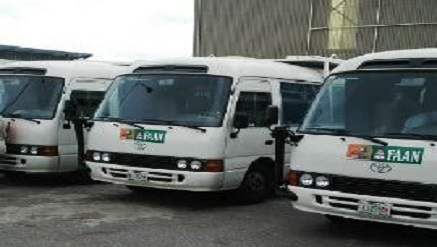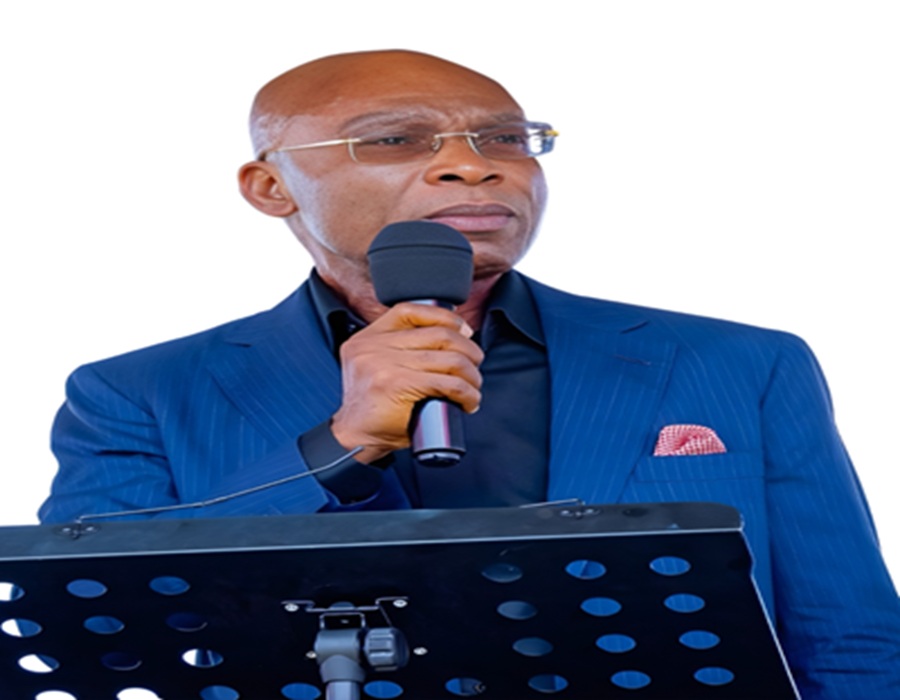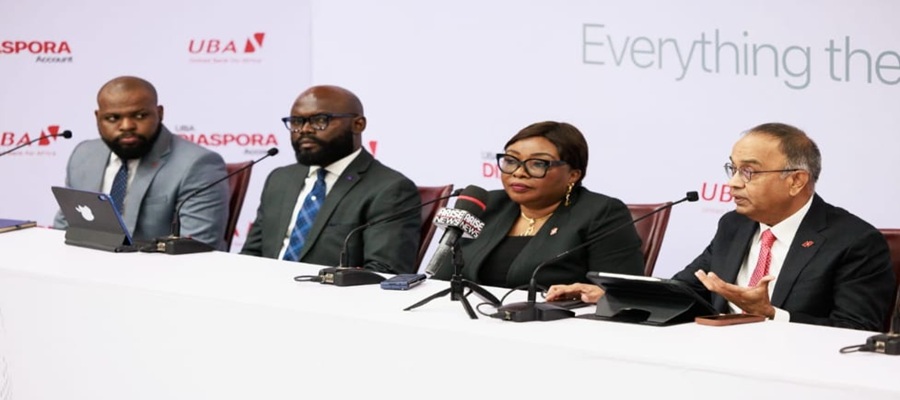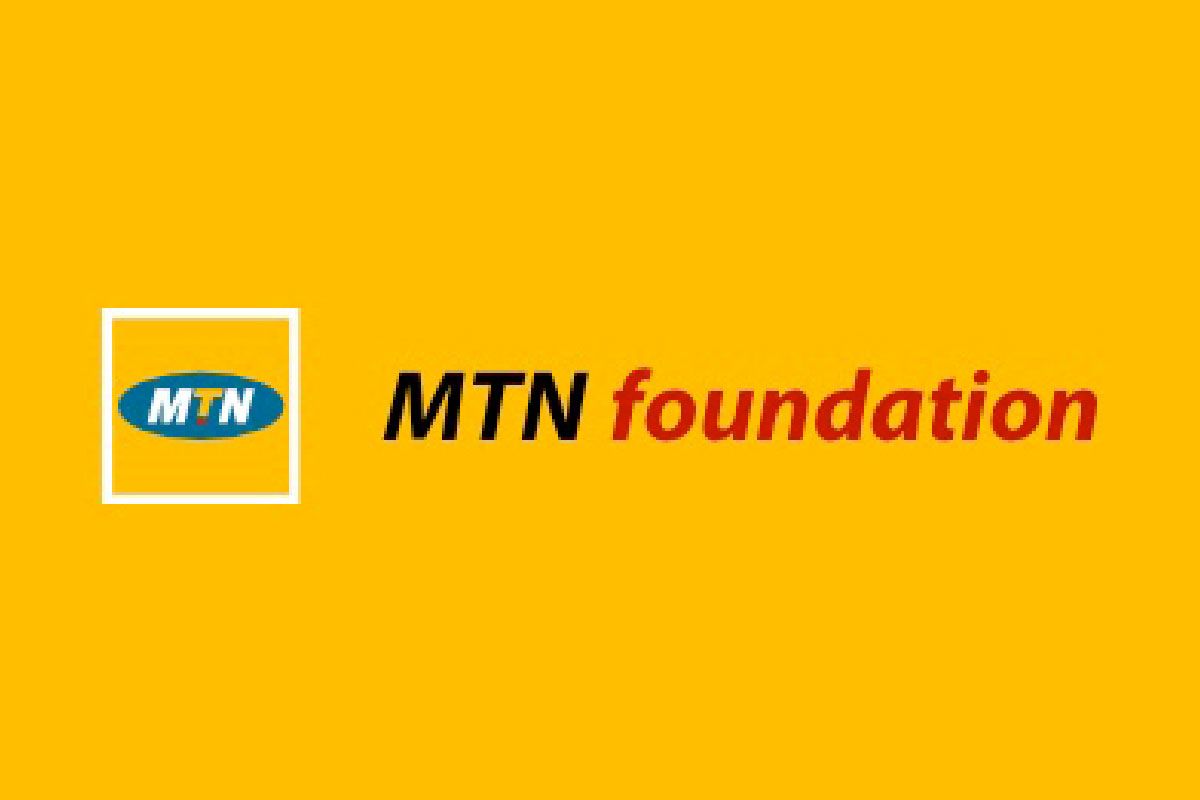General News
FAAN Sensitizes Workers, Deploys Shuttle Buses @ MMIA

The Airport Rescue and Fire Fighting Services (ARFFS) of the Federal Airports Authority of Nigeria (FAAN) recently conducted a fire simulation and prevention exercise for the FAAN workers and other stakeholders operating at the Domestic Terminal 1 of the Murtala Muhammed Airport, Ikeja, to prepare them for fire emergencies at the airport.
Similarly, transportation between the local and international terminal of Murtala Muhammed Airport Lagos, recently received a boost with the deployment of four shuttle bus to ply the route by FAAN in partnership with Skyplus Contracts and Logistic Limited.
The fire simulation and prevention exercise which was led by Mrs. Dorothy Egwu, the terminal’s fire officer, was also designed to ensure that fire safety standards are regularly maintained within the terminal.
Egwu emphasized that fire safety was based on the principle of keeping fuel sources and ignition sources separate.
She said that oxygen, heat and fuel, which are combustive materials, work together to produce the chemical reaction that result in fire and stressed that the three components must be removed for fire to be extinguished.
She explained that the three common types of fire extinguishers were water, carbon dioxide and dry chemical powder extinguishers, adding that fire had four categories namely category A, which is for solids that are not metals e.g. paper and wood.
“This category” she said “could be extinguished with air pressurized water and dry chemical powder. Category B, fire is for flammable liquids such as gasoline while category C is for energized electrical equipment. These two groups, she said could be extinguished with carbon dioxide and dry chemical powder. Category D fire which is for metals such as potassium and aluminium, she said, required special extinguishing agent”.
While demonstrating how to use the fire extinguisher, Mrs. Egwu enjoined all participants to remember the acronym PASS which means – Pull the pin, Aim at the base of the fire, Squeeze the top handle, Sweep from side to side until the fire is completely out.
Mrs. Dorothy Egwu advised that in the event of a fire, people should leave the building through the nearest exit and assist any person in immediate danger to safety without risking their own lives.
Furthermore, Mr. Yakubu Dati, coordinating general manager (Aviation Parastatals), also said that the 30-seater shuttle buses were deployed by FAAN in partnership with Skyplus Contracts and Logistic Limited.
Dati quoted Mr. Tayo Adewakun, FAAN’s general manager commercial, who unveiled the buses on September 1, 2014, at the car park of MMA’s Domestic Terminal 1, saying the deployment of the vehicles was not to compete with regular car hire operators but to ease the movement of transit passengers from domestic to international terminals and vice versa.
Accompanied by other commercial staff of the Authority, Adewakun disclosed that the buses would pick passengers from DT1 and drop them at MM2 and international wing without stopping on the road.
He added that the shuttle bus would not pick any passenger on the road but at DT1 and MMIA. The buses would only drop passengers at MM2.
Speaking during the launching of the shuttle bus, Mrs Shobayo, managing director of Skyplus Contract and Logistics, said she was motivated into partnering with FAAN because of her experience as a frequent flyer.
Shobayo noted that the deployment of the shuttle buses would bridge the gap between the local and international airport terminals, adding that getting a drop for passengers on transit was always risky.
She commended FAAN’s management for the accelerated approval given to her company for the shuttle service.
The shuttle buses are fully air-conditioned with enough room legs for the comfort of passengers. They also have luggage compartments where passengers’ luggage could be accommodated.
General News
Leo Stan Ekeh Foundation, Zinox Group To Invest 10B on 1000 University Tech Scholarships for Indigent Nigeria Wiz-kids

By Eunice Omokaro
Africa’s foremost tech icon and Chairman of Zinox Group, Leo Stan Ekeh, who turns 70 on February 22, this year, has explained why he is not celebrating his 70th birthday with a mega party, preferring to offer University scholarships to additional 1000 Nigerian indigent wiz-kids to study Computer Science in Federal Universities so that the country’s private and public sectors could have a new generation of tech wiz-kids to support the growth of the economy.

Leo Stan Ekeh
He anticipates that these students who will not be bonded, shall disrupt global wealth equation in favour of Nigeria and defend our tech independence. Selection shall be based on a minimum Intelligent Quotient and age nationwide, and they shall be schooled and exposed beyond tech to become global Tech Citizens.
Speaking on phone, Ekeh said “Each shall have a tech mentor from year one, as I plan a partnership with Computer Society of Nigeria and every vocation they shall be engaged resourcefully. Beneficiaries shall be from poor homes and those with parents who earn below Government Level 10 and its equivalent in the private sector. The first batch starts this September, and I expect each to earn first class degree. This is my Group of companies’ and my little way of appreciating my country, individuals and corporates that gave us the opportunities in the last 40 years and still patronizing our Tech Group – Task Systems, TD Africa, Zinox Technologies, Konga etc. If we are successful with this spiritual mandate, I can then celebrate my 100 years on earth with a bang. With God and AI, I am aiming to make 120 years,” he said.
Ekeh, a largely humble and private person not known for celebrating birthday milestones, explained that rather than throwing a lavish birthday party befitting his newly attained septuagenarian age, he has chosen with his Group’s Management to provide world-class tech human capital to support growth of the nation’s economy.
“We need quality and tech-savvy wiz-kids who can drive the future of government and e-governance and those who will become change-makers in the private sector.
“I have been blessed and bruised in this country and I thank God. Frankly, I don’t see enough Nigerian tech wiz-kids who can defend the massive development anticipated in the next 5 – 10 years in the oil and gas, banking, agriculture, manufacturing, mining, entertainment, etcetera, and public sectors. We are becoming slaves in our own country in a knowledge century which is unfortunate. We are all arrogantly living just for today, forgetting that only four God-anointed tech wiz-kids can alter the GDP of this country in five years. The man who controls your tech resources decides your profit level and how far your country and corporations can grow in this second quarter of the 21st Century and in future,” he said.
Ekeh, who was once decorated by President Olusegun Obasanjo as ‘Icon of Hope’ on Nigerian Independence Day in 2003, for his tech-driven transformative impact on Nigerian economy and the youths, said Nigeria must begin to plan for the disruptions coming.
“The future is here but very fragile and disruptive, it’s either you are something or nothing at all. No middle ground. We need to alter the digital trajectories of our people. Technology is realistically the only profession in the world today that can alter the destiny of brilliant and humble kids from poor families and position them as huge wealth creators and sustainers. Though I am not really from a very poor family, but I am a testimony and shall tell the whole story in my book that shall be published last quarter of 2027. It shall be most revealing.
“This is my additional contribution amongst others to appreciate Nigerians, the Federal Government, sub- nationals and corporations that have been supporting my tech commitments and innovations on this side of the Atlantic,“ the soon-to-be septuagenarian said.
When asked how much it will cost to undertake such gigantic project, he said: “It is a spirit-driven project to thank those who supported and are still supporting companies within the Zinox Group. It has an annual cost that shall run into billions of Naira and my group is committed to it amongst other social responsibility projects like TD Africa Project to produce 10,000 female tech experts out of which 400 have graduated and are fully employed in different corporates in Nigeria. This is a 10-year project with other perks. The full package shall be revealed online on April 22, 2026,” he said.
However, beyond his birthday and the scholarship initiative, Ekeh in the last 40 years has been a worthy role model for philanthropy and a living exemplar of what it means to live for public good. He has been decorated with a lot of local and international awards. His group has trained and retrained over 3000 Nigerians and donated tech centres to over 25 institutions nationwide just to mention a few.
Ekeh was a former mass servant and chorister in his local community Catholic Church at Ubomiri, a sprawling community on the fringes of Owerri, Imo State.
One of his favourite pastimes is to seek out the poor and help them come up the ladder of life. He is an entrepreneur who draws a distinct line between capitalism and welfarism? He believes that capitalism must wear a human face; that profit must not take the place of empathy as no one came with and shall leave this earth with cash.
His philanthropy is not limited by geography. From south to the north, his imprints of charity dot many educational institutions. A couple of years ago, he built a church complete with rectory in his Ubomiri community, the same church where he was once a mass servant.
At the dedication of the church, he recalled in an emotion-laden voice: “My grandfather produced a Reverend Father who was ordained same day with Rev Canon Tansi. My father as a past time was a soloist in this church, and he served God with all his might; I was a mass servant and a member of this choir (pointing to the horde of choristers robed in red outfit). I have never tasted alcohol or smoked since I was born and I don’t know why. It was something that never appealed to me or fascinated me. I believe our good God decided to save me from birth.
“I come from a lineage of people who served God dedicatedly. I think I am a miracle child and was clear who I wanted to be from the day I launched out as a tech entrepreneur. I saw myself as an only Child even though I have siblings and, as an orphan even though my parents were alive and a bit civilized because no person around me even though educated, had tech knowledge to advise me, so I decided to take the pain before pleasure alone.
“I love God and will never hesitate to do anything in the service of God and humanity. I built this church as a mark of God’s special love and mercy towards me. I have the best wife any man would wish to have. She is a super star. She is intelligent, beautiful and unlike some women, she is not expensive and more importantly, we operate on the same tech wavelength. If for any reason I get stuck, she is the one to figure out the solution for me. God blessed me with brilliant and responsible children too. I am grateful to God because He has seen me through the valleys and mountains of life. As a mark of God’s mercy to me, I pay corporate tithes for all my companies. I didn’t read it in the Bible but I do it”, he told the audience.
“God is the architect of my success. As an entrepreneur, I have strategised, stayed up late, made projections but if there was no mercy of God and His grace to help me implement these, there will be no success. God has done me well; even for me to be alive, to come from the family I come from, the village, town, region and country I come from. Most importantly, God has managed me because He gave me a proactive personality, removing all the holes in my life. The temptations are there, you can imagine them. Maybe if I was taking alcohol, I would have been a mental guy. I work an average of 20 hours a day and near zero holidays and I have no health challenges,” he once told some journalists.
For Ekeh, the Forbes Best of Africa Leading Tech Icon, the scholarship for 1,000 Nigerian students remains a tiny drop in the ocean of multitude of philanthropies he has extended to persons and institutions across the continent quietly. Through his Leo Stan Ekeh Foundation (LSEF), his family’s non-profit, and the various companies under the Zinox Group, he has impacted humanity and institutions both in cash and kind, especially human-capital development, upskilling the hitherto unskilled in tech-techniques, institutionalising entrepreneurship in select universities and awarded countless local and overseas scholarships to Nigerians of all tribes and tongues to advance their quest for knowledge.
In the last two years alone, the Foundation launched three entrepreneurship centres at St. Augustine University in Epe, Lagos, Federal University, Birnin Kebbi, Kebbi State, Imo State University (IMSU) etc. The centres had been upskilling young men and women turning them to wealth and job creators, rather than job-seekers. At the IMSU centre, it was a moment of joy for about 200 young Nigerians who were the first set of beneficiaries of a 3-month entrepreneurship boost programme.
They were taught the fundamentals of entrepreneurship by the best coaches and experts drawn from Nigeria, United States and United Kingdom. Not only were they tutored by the best whizzes in diverse fields of human endeavour, they were also kept on a stipend throughout the duration of the programme to augment their weekly commute to the centre. In addition, each trainee was gifted a brand-new Z-pad tablet to aid their learning and upskilling process. Some also received interest free loans to launch their businesses.
What’s unique about Ekeh and his philanthropy is that he does them behind the scene. No cameras flashing. No media buzz. Just humane acts of a man fated for greatness and encased in God’s grace.
General News
UBA Unveils Diaspora Platform to Connect Global Africans with Investment, Wealth Opportunities

United Bank for Africa (UBA) Plc, Africa’s Global Bank, has unveiled a diaspora banking and investment platform designed to serve Africans living and working across the world and within the continent.

L-R: Head, Strategy, Research & Investor Relations, Africa Prudential, Joshua Omewah; Group Head, Sales, Retention and Growth, AVON, Ajibola Bakare; Managing Director, UBA Pension, Blessing Ogwu and Head, Diaspora Banking, Anant Rao, during UBA’s Panel session, themed: ’Beyond Banking: Powering the Diaspora Lifestyle,’ held at UBA House Marina, in Lagos on Thursday.
The platform, launched in collaboration with leading ecosystem partners including United Capital, Africa Prudential, UBA Pensions, Afriland Properties, Heirs Insurance Group, and Avon Healthcare Limited — represents a major step in redefining diaspora banking beyond remittances toward structured wealth creation and long-term investment.
At the unveiling, which took place at UBA’s global headquarters in Lagos under the theme: “Beyond Banking: Powering the Global African Lifestyle, all the company representatives were on hand to showcase a seamless platform that goes beyond remittances, wealth creation, protection, and long-term prosperity.
Speaking at the event, UBA’s Head of Diaspora Banking, Anant Rao, described the initiative as a strategic shift in how Africa engages its global citizens.
“For decades, Africa’s engagement with its diaspora has focused largely on remittances. Today, we are moving beyond that. This platform represents a transition from simple money transfers to a financial ecosystem where Africans globally can bank, make payments, invest, protect their families, and build long-term wealth seamlessly,” he said.
Rao noted that African diaspora remittance flows exceed $100 billion annually, making them one of the most resilient and consistent sources of capital into the continent.
“Diaspora capital is not just a flow of funds — it is a strategic growth partner for Africa.
Our role is to provide a trusted platform that converts capital into structured investment and shared prosperity across the continent.”
The objective is to provide a platform that brings together offerings across the numerous needs of the Global African, including Banking and payments, Investments, securities services, asset management, Insurance, Pensions, real estate and Pensions.
Through this coordinated ecosystem, diaspora customers can access financial solutions across multiple sectors through a single trusted platform, enabling them to manage their financial lives and family commitments across borders with ease and transparency.
UBA’s Group Head, Marketing and Corporate Communications, Alero Ladipo, emphasised the importance of collaboration in delivering a seamless diaspora experience.
“The modern African is a global citizen — mobile, ambitious, and deeply connected to home. Whether living in Africa, Europe, the Americas, or the Middle East, there must be a structured and secure financial connection back home. This platform ensures that Africans everywhere can remain economically connected to the continent with confidence and transparency.”
Partners within the ecosystem highlighted growing demand among diaspora Africans for structured investment opportunities, secure property ownership, insurance protection, and long-term financial planning.
United Capital showcased globally accessible investment products designed to deliver professionally managed and transparent wealth creation opportunities.
Afriland Properties emphasised structured and well-governed real estate investment pathways for diaspora clients.
Heirs Insurance highlighted protection solutions for life, and assets, while Avon Healthcare Limited demonstrated healthcare access and insurance solutions for families across borders.
Africa Prudential and UBA Pension reinforced digital investment management and long-term pension savings solutions designed to support diaspora participation in African capital markets.
Together, the partners underscored a shared commitment to providing diaspora Africans with credible, transparent, and professionally managed financial pathways.
Rao also reiterated the guiding philosophy of Africapitalism, championed by UBA’s Founder and Chairman, Mr. Tony O. Elumelu, CFR.
He explained that Africapitalism is the belief that Africa’s private sector must play a leading role in the continent’s development by making long-term investments that generate both economic returns and social impact.
As Africa continues to position itself as one of the world’s most dynamic growth frontiers, UBA believes mobilising diaspora capital through trusted financial institutions will be central to shaping the continent’s next phase of development.
“Africa will increasingly be financed by Africans themselves, including Africans abroad,” Rao added.
“Our responsibility is to build the trusted financial infrastructure that makes this possible.”
“When Africa’s global citizens invest back into Africa, growth becomes inevitable,” he concluded.
General News
BOI, MTN Foundation Unveil N1Bn Fund for Women Entrepreneurs

Bank of Industry (BoI) and the MTN Foundation have signed a memorandum of understanding to establish a N1bn Matching Fund to expand access to finance and capacity building for women-led micro enterprises across the country.

The institutions said the fund, under the Y’ellopreneur 3.0 programme, would operate as a pilot to reach women running viable businesses who remain excluded from formal credit due to collateral and documentation requirements.
Speaking at the signing ceremony held recently in Lagos, Dr Olasupo Olusi, managing director and chief executive officer of BOI, said the initiative goes beyond the continuation of an existing collaboration and targets women at the base of the economic pyramid.
Olusi said the intervention focuses on women who operate viable businesses but remain excluded from structured finance.
He said, “Across Nigeria, women sustain a large share of micro-businesses in the markets and communities, while processing and providing services that support household income and local economic activity.”
Olusi added that despite their contributions, many women cannot access affordable capital because traditional lending models demand documentation, collateral, and financial histories that do not reflect how their businesses operate.
The BoI CEO noted that the partnership aims to bridge that financing gap through a model tailored to women entrepreneurs who need funding the most.
He said, “This partnership is designed to specifically bridge that gap. The programme is structured as a pilot to test, learn and refine the model that works for women entrepreneurs who need financing the most, while building a framework that can be sustainably expanded over time.”
Olusi explained that beyond credit provision, the programme embeds capacity building, business development support, and mentorship. He disclosed that the partners plan to train about 1,000 women entrepreneurs in record-keeping, growth management, and competitiveness.
He stressed that an expanding opportunity at the microenterprise level strengthens productivity, stabilises income, and contributes to broader economic resilience.
“BOI remains committed to working closely with MTN Foundation and all stakeholders to ensure the effective implementation of this programme,” he explained. “Our focus will be on transparency, on sustainability and measuring outcomes so the programme delivers real value and provides a model that can be replicated under other programmes.”
On her part, Odunayo Sanya, executive director of MTN Foundation, said the renewed partnership builds on earlier pilot phases that helped both institutions refine their approach and scale impact in women-led businesses.
Sanya said the new phase seeks to deliver faster and more measurable outcomes for women-owned enterprises. She explained that the foundation aims to build capacity for 30,000 female-led businesses by 2030, up from nearly 6,000 reached so far, while unlocking access to capital for 10,000 women-owned enterprises through the renewed partnership with BOI.
Sanya stated, “This partnership will deepen support for women entrepreneurs, improve business survival rates, and attract additional partners to scale funding for the segment.”
She added that the initiative would combine training, mentorship, and financing and serve as a blueprint for broader public–private cooperation in unlocking new pools of capital for enterprise development and inclusive growth in Nigeria.

 E-Financial3 days ago
E-Financial3 days agoNAICOM Targets Resilient, Global Competition Market in Insurance Sector Consolidation

 News3 days ago
News3 days agoNITDA Explores Partnership with Trust Stamp on Digital Trust and Innovation

 Telecom3 days ago
Telecom3 days agoNCC Orders Telcos Inform Subscribers of Data Breach within 48 Hours

 E-Financial3 days ago
E-Financial3 days agoIGP Designates Banks National Security Asset, Orders Crackdown on Cyber Frauds

 General News3 days ago
General News3 days agoCybersecurity Firm Warns Against Gift Card Scams @ Saint Valentine’s Day

 E-Financial3 days ago
E-Financial3 days agoRashidat Adebisi Unveils Strategic Roadmap for Nigeria’s Insurance Sector under NIIRA 2025

 Telecom3 days ago
Telecom3 days agoMTN Backs Bosun Tijani’s Vision for Africa’s AI Leadership

 Telecom3 days ago
Telecom3 days agoGlobacom Promotes Valentine Gifting with Huge Discounts on Smartphones
























